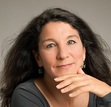Susan Rich's Blog, page 5
November 17, 2018
It Took Too Long To Write This Experience In a Poem
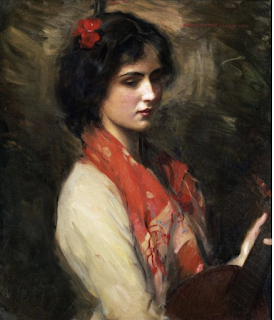 Young Woman with Mandolin by Harrington Mann
Young Woman with Mandolin by Harrington MannIt has taken too long. Too long for so many things to come to light. Here is a recent poem that takes "inspiration" from a core event that happened over thirty years ago. Thank you so much to Jordan Hart and Kahini Magazine for publishing this in their November issue. And for the writers among us,
Kahini Magazine is a paying market for both poetry and fiction.
Arborist / Abortionist
by Susan Rich

Procured by anxious relatives
who demanded
a disappearing trick—
prepaid like a surcharge
for yard work done in the off-season:
his steel tool severing
a quirk of a tree limb,
attached to the nub of a stubborn bud;
he didn’t question
how I appeared,
transplanted into his waiting room—
never inquired as to the coauthor
of my infinitesimal text—
although he’d memorized its map;
extracted the troublesome little branch
that obscured the golden overlook,
and restored the river view.
Published on November 17, 2018 12:56
October 17, 2018
The Joy of Poetry (That Swings Both Ways) Academy of American Poets, Practicing Poet, and the Southern Review
 Reading Woman in Violet Dress - Matisse, 1892I wonder if Henri Matisse ever imagined that his paintings would travel around the world with the choice click of a few keys? The internet is known for many things --- but access to the arts is not one I hear of very often.
Reading Woman in Violet Dress - Matisse, 1892I wonder if Henri Matisse ever imagined that his paintings would travel around the world with the choice click of a few keys? The internet is known for many things --- but access to the arts is not one I hear of very often.This summer I was wildly honored to have my poem "To The New Journal" published in the Summer 2018 Issue of the Southern Review. This is the third time I've been published in SR and I am a true fan of both the words and the visual art that they publish. Their editors are professional, kind, and smart. But there's one thing.
The Southern Review doesn't feature much work on their website and so once the physical object of the journal is read and put on the shelf (and maybe tossed from libraries at a later date) most of the poems and prose are gone. Enter the Academy of American Poets with a new project: to showcase more poems on their website. Through an agreement with the Southern Review and Tin House, poems that were published in these print journals may now have a forever home as part of the Academy's curated collection. This is the reason I can share "To the New Journal" with you.
.
Much like the Poetry Foundation website, the Academy of American Poets website seeks to provide an essential resources of poems, essays on poetry, poet bios, and lesson plans to anyone who is interested. Need a poem to read for a wedding or for a divorce? These websites can help! Teaching a poet and want to bring their voice into the classroom? These are great sites to access.
However, sometimes poems swing the other way: from the worldwide ether onto the printed pages of a book. My poem, "Boketto" based on the Japanese word which loosely translates to, to stare into space with no purpose, appeared on the Academy of American Poets site two years ago. This month, "Boketto" stars in the new "must have" craft book, The Practicing Poet, Writing Beyond the Basics, by editor, poet, and publisher extraordinaire, Diane Lockward.
Diane contacted me and asked for permission to reprint "Boketto" in her newest anthology / craft book (this is her third and each one is worth owning) and I happily agreed. In The Practicing Poet, Diane has created a prompt for a "weird word poem" based on my work. She has also done an explication of the poem that showed she had read the work carefully noticing the focus on double-barreled words and chiasmus (and no, I didn't know the word chiasmus before yesterday) but I like it and it describes a key strategy of the poem.
So this month I get to swing both ways: page poems onto the web and web poems onto new pages. I'm feeling very lucky indeed.
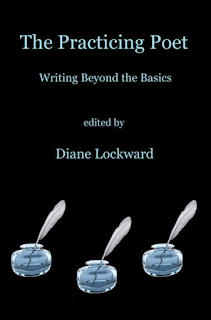
Published on October 17, 2018 13:22
September 30, 2018
Two Poems for Right Now
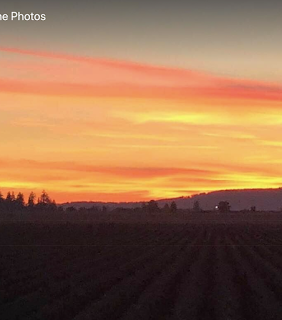 Sunset over Potato Fields, Monday at Harmony FieldsI took this photograph six days ago ago at Harmony Fields, yet so much has changed since then that I hardly recognize that it hasn't even been a week: this was before Dr. Blasey-Ford's testimony, before two brave women, Maria Gallagher and Ana Maria Archila, confronted Senator Flake (R-AZ) in an elevator and before he changed the course of history --- at least for one week; we hope for more.
Sunset over Potato Fields, Monday at Harmony FieldsI took this photograph six days ago ago at Harmony Fields, yet so much has changed since then that I hardly recognize that it hasn't even been a week: this was before Dr. Blasey-Ford's testimony, before two brave women, Maria Gallagher and Ana Maria Archila, confronted Senator Flake (R-AZ) in an elevator and before he changed the course of history --- at least for one week; we hope for more.Lucillle Clifton and Adrienne Rich are two important poets for me (for American poetry) that I return to again and again. The day after the 2016 election I shared the Clifton poem with my Highline College students. I'll never forget one young man sitting with this poem and then articulating his thoughts and ideas about it beyond anything he had done in class before. He illuminated the levels of this piece for me, for the entire class, in a new and necessary way. He brought in the idea of immigration, the trip many of my students have taken in boats, in braving a new world. I share these pieces now as a way to hold onto sanity in this new insane time. May they be of help to you, too.
blessing the boats
BY LUCILLE CLIFTON
(at St. Mary's)
may the tidethat is entering even nowthe lip of our understandingcarry you outbeyond the face of fearmay you kissthe wind then turn from itcertain that it willlove your back may youopen your eyes to waterwater waving foreverand may you in your innocencesail through this to that
What Kind of Times Are These
BY ADRIENNE RICH
There's a place between two stands of trees where the grass grows uphill
and the old revolutionary road breaks off into shadows
near a meeting-house abandoned by the persecuted
who disappeared into those shadows.
I've walked there picking mushrooms at the edge of dread, but don't be fooled
this isn't a Russian poem, this is not somewhere else but here,
our country moving closer to its own truth and dread,
its own ways of making people disappear.
I won't tell you where the place is, the dark mesh of the woodsmeeting the unmarked strip of light—ghost-ridden crossroads, leafmold paradise:I know already who wants to buy it, sell it, make it disappear.
And I won't tell you where it is, so why do I tell youanything? Because you still listen, because in times like theseto have you listen at all, it's necessaryto talk about trees.
Published on September 30, 2018 12:48
September 20, 2018
Such a Good Mix: The Poetry of Travel and the Travel of Poetry
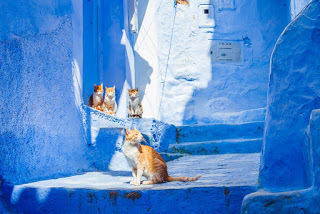 Calico Cats in Morocco's Blue City: Chefchaouen
Calico Cats in Morocco's Blue City: ChefchaouenI love poetry and I love travel. When the two join together, it feels like my life makes sense. All day I've been thinking about my favorite poems concerning travel for a class I'm teaching this weekend at a beautiful family farm in Bow-Edison, Harmony Fields.
For about 20 years I kept this one poem in my wallet. Then it lived on a bulletin board in my office and recently, it migrated to the kitchen. I like that it's been with me since December 1994. I think this was my first year subscribing to the New Yorker Magazine . I had just let my apartment in Harvard Square for the wilds of the Pacific Northwest for graduate school. I missed the grit of the Boston accent, the cold stare of strangers, the bookstores.
This poem spoke to me --- my decade plus of living faraway in Africa, Europe, and working in the Arab world. More than two years away from the US, I entered New York via JFK only to have the customs officer question if I was making up the country of Niger. He was angry with me for coming from a place he didn't know.
Seamus Heaney never included this in any of his books. I don't know why but I suspect that perhaps it was too internal, so common and uncommon at once. See what you think.
Far Away
When I answered that I came from “far away”The policeman at the roadblock snapped “where’s that”?He’d only half heard what I said and thoughtIt was the name of some place up the country.
And now it is both where I have been livingAnd where I left --- a distance still to goLike starlight that is light years on the goFrom faraway and takes light years returning.
~Seamus Heaney, The New Yorker, December 26, 1994
Published on September 20, 2018 20:10
September 14, 2018
Some of my favorite things: poetry, farmland, and food
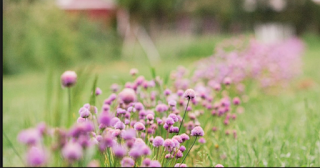 Harmony Fields Forever!
Harmony Fields Forever!Cheese, donkeys. ducks, eggs, herbs, and sheep! It's a wonderful litany of some of the joys of Harmony Fields where I will be teaching a half day poetry workshop very soon! I first met Jess Gigot when she contacted me for some advice when her poetry collection, Flood Patterns, was about to be released. We met over Skype(!) and I advised her on book promotion, tours, and travel --- but honestly, she had figured out much of the poetry biz for herself. As a farmer, fiction writer, musician, poet, and visual artist --- she is a woman of many talents which is why I'm so happy to be teaching at her farm!
Bow-Edison is an easy drive from Seattle and a gorgeous place to stop at the many farm stands and one of the coolest bakeries anywhere in the world, Bread Farm. It is worth the trip just to visit this world-class bakery!
Okay. I meant to write about my upcoming class on "The Poetry of Travel: How to Write of the Extraordinary," but I've gotten carried away thinking of miniature donkeys and bread!
Here's a little information about my class! Limited to 12 participants; we welcome all people! Please know that travel can mean to travel back in time; to travel via the imagination; to travel towards the future.
The Poetry of Travel: How to Write of the Extraordinary
Anais Nin once wrote, “We travel, some of us forever, to seek other states, other lives, other souls.” And whether the destination is Paris, Marrakesh, or the Pike Place Fish Market — the art of translation from one realm to the other remains the same conundrum. This workshop is for anyone who has traveled in the world of the imagination and/or the physical realm. We’ll look at the work of several poet-travelers and then write pieces of our own. You will leave with the starts of at least four new poems or flash fiction pieces. This class is geared towards beginners and experienced writers, and for poets as well as flash fiction writers. Local lunch provided.
Instructor: Susan RichWebsitehttp://poet.susanrich.net/
Date September 22, 2018: 11:00 am - 2:00 pm
LocationHarmony FieldsCost (including lunch) $80.00
Contact360-941-8196 or farm@harmonyfields.com
To register: check out Harmony Fields Event Page
Published on September 14, 2018 12:32
September 6, 2018
What is your best piece of advice for aspiring writers? Thanks to Nimrod Journal~
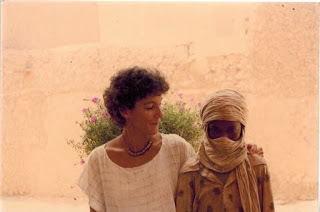 The poet as a young Peace Corps Volunteer in NigerWhat is your best piece of advice for aspiring writers?And here's my answer:
The poet as a young Peace Corps Volunteer in NigerWhat is your best piece of advice for aspiring writers?And here's my answer:Keep writing and reading and surrounding yourself with people who do the same. Glean something new from every poem you read, every teacher you have. One of the beautiful things about saying yes to the call of writing is that you will always be a student of word and sound and syntax.
Thank you to Eilias and Nimrod Journal for this interview. I am honored to be in the current issue Let Us Gather: Diversity and the Arts, My poem, "17 Years After Her Death, Cousin Molly Appears to Me Outside Kuppels Bagel Bakery." You can read the rest of it right here.
Published on September 06, 2018 07:53
September 3, 2018
Returning to an Old Love - Joseph Cornell
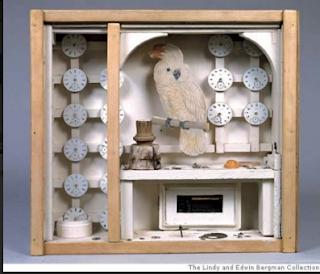 Cockatoo (Aviary and Watches) circa 1948 I believe I first came in contact with Joseph Cornell through the poetry of Charles Simic. Simic's Dime-Store Alchemy published in 1992 was one of the first hardback books of poetry I bought. I have to admit that the cover had a good deal to do with my choice --- as did the title, Dime-Store Alchemy. Rereading this book now I realize it was one of the first project-based collections that I had encountered. Simic stated that he wanted to approximate in poetry what Cornell did with visual assemblage.
Cockatoo (Aviary and Watches) circa 1948 I believe I first came in contact with Joseph Cornell through the poetry of Charles Simic. Simic's Dime-Store Alchemy published in 1992 was one of the first hardback books of poetry I bought. I have to admit that the cover had a good deal to do with my choice --- as did the title, Dime-Store Alchemy. Rereading this book now I realize it was one of the first project-based collections that I had encountered. Simic stated that he wanted to approximate in poetry what Cornell did with visual assemblage. In his introduction to his own book, Charles Simic writes of Cornell:
"Somewhere in the city of New York there are four or five still-unknown objects that belong together.
Once together they'll make a work of art. That's Cornell's premise, his metaphysics, and his religion....[3]:14 Marcel Duchamp and John Cage use chance operation to get rid of the subjectivity of the artist. For Cornell it's the opposite. To submit to chance is to reveal the self and its obsessions."
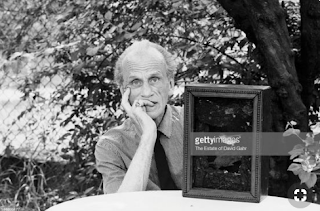
"My work was a natural outcome of my love for the city," Cornell said.
Cornell couldn’t draw or paint. He didn’t consider himself an artist, instead he called himself a “maker” or “designer.” Living in New York City in the depression, Cornell became a collector of small objects and photographs, things he found on his walks through the city.
One day in 1931, Cornell visited Julian Levy as he prepared photographs by Alfred Stieglitz for show. Levy was just about to open the Julien Levy Gallery, and Cornell watched as Levy unpacked new surrealist collages by Max Ernst. This sparked Cornell to go home and make his own collages, using the photographs he’d been collecting. He brought the collages back to Levy, and his work debued along with the surrealists from Paris: Max Ernst, Man Ray, and Salvador Dali in the 1932 exhibition Surréalisme at the Julien Levy Gallery, the first Surrealist exhibit in America. One of Cornell’s first collages ended up being the show postcard. (Guardian)

Much is known (and repeated) about Cornell. He lived on Utopia Parkway, Flushing, NY and never left the Northeastern United States. He lived with his mother and his younger brother, living alone after they'd both passed on. Cornell had no formal training as an artist, he made his living selling textiles. By all accounts, his life experiences were not vast or wide. And yet that mattered little in the making of his art.
And long after many mid-century artists seem forgotten or locked in another time, Cornell seems to only become more relevant, more exciting. I recently learned that Leonora Carrington lived in the states for 25 years --- in New York and in Chicago. I can't help thinking the two of them would have had much to talk about. And perhaps they did meet, did walk through Central Park and comment on the pigeons. Perhaps.
Published on September 03, 2018 22:08
August 26, 2018
Poetry of Travel: How to Write of the Extraordinary (For Everyone)
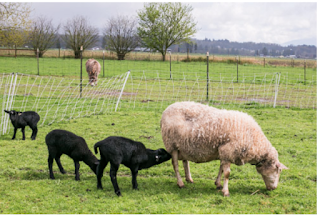 Harmony Fields, WashingtonI am super excited to return to Harmony Fields, a working family farm, to teach a one day class that includes a delicious farm to table lunch! As these Pacific Northwest days become cooler and the summer transitions to fall, it is time to jumpstart your writing practice---or perhaps begin the one you've been wanting to try for years. And there is no more inspiring and nurturing place to do it.
Harmony Fields, WashingtonI am super excited to return to Harmony Fields, a working family farm, to teach a one day class that includes a delicious farm to table lunch! As these Pacific Northwest days become cooler and the summer transitions to fall, it is time to jumpstart your writing practice---or perhaps begin the one you've been wanting to try for years. And there is no more inspiring and nurturing place to do it.Harmony Fields is located in the Bow-Edison area of farms, restaurants, and artisan shops. There's an amazing bakery, Breadfarm, one of the best in the country, if not the world. I may not have visited the entire world but Breadfarm is a place like no other. Oh, but we will be writing poetry! All ages and people welcome. Last time our age range was 20's to 80's. And if you haven't gone on that round-the-world trip yet, no worries. A city bus ride or a walk down the grocery aisle also constitutes the poetry of travel. I would love for you to join me. Space is limited and you must register in advance :-)_
 Chefchaouen, MoroccoTHE POETRY OF TRAVEL: Anais Nin once wrote, “We travel, some of us forever, to seek other states, other lives, other souls.” And whether the destination is Paris, Marrakesh, or the Pike Place Fish Market — the art of translation from one realm to the other remains the same conundrum. This workshop is for anyone who has traveled in the world of the imagination and/or the physical realm. We’ll look at the work of several poet-travelers and then write pieces of our own. You will leave with the starts of at least four new poems or flash fiction pieces. This class is geared towards beginners and experienced writers, and for poets as well as flash fiction writers. Local lunch provided.
Chefchaouen, MoroccoTHE POETRY OF TRAVEL: Anais Nin once wrote, “We travel, some of us forever, to seek other states, other lives, other souls.” And whether the destination is Paris, Marrakesh, or the Pike Place Fish Market — the art of translation from one realm to the other remains the same conundrum. This workshop is for anyone who has traveled in the world of the imagination and/or the physical realm. We’ll look at the work of several poet-travelers and then write pieces of our own. You will leave with the starts of at least four new poems or flash fiction pieces. This class is geared towards beginners and experienced writers, and for poets as well as flash fiction writers. Local lunch provided.Instructor: Susan Rich Website http://poet.susanrich.net/Date: September 22, 2018: 11:00 am - 2:00 pm
Location: Harmony Fields Cost (including lunch)$80.00Contact360-941-8196 or farm@harmonyfields.com
Register https://harmonyfields.com/event/the-poetry-of-travel-how-to-write-of-the-extraordinary/
Published on August 26, 2018 10:32
August 23, 2018
An Interview with Lyanda Lynn Haupt and Carmen: A True Pleasure
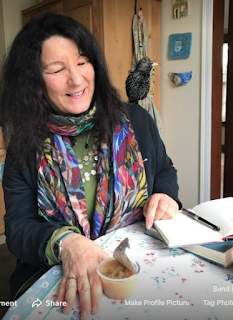 Carmen gazing out at the world from my shoulder
Carmen gazing out at the world from my shoulderMy first encounter with a starling taking up residence on my shoulder was memorable. It began with gum-like starling poop in my hair. Lyanda apologized and let me know that Carmen is a little nervous around strangers. I understood. I had fallen in love with Carmen through Lyanda Lynn Haupt's newest book, Mozart's Starling, published by Little Brown. However, meeting this wild bird in Lyanda's kitchen was a bit nerve wracking for me as well.
Let me explain. I come from a Boston suburb with parents who couldn't tell a Hummingbird from a Goldfinch. And yet, moving to Seattle changed all that. Seattle is a city of bird lovers where every house comes equipped with a bird feeder (okay, mine did). And this book, this book made me a bird lover for life. If you read one non-fiction book this year, you need to give yourself the true pleasure of Mozart's Starling by Lynada Lynn Haupt.
 Carmen gives her peck of approval to my favorite new book
Carmen gives her peck of approval to my favorite new bookI first heard Lyanda Lynn Haupt at WordsWest in West Seattle where she read pages from her (then) yet-to-be published book, Mozart's Starling. I was immediately blown away. Here is a prose writer who writes sentences as beautiful as those of any poet. And just last week, Mozart's Starling was nominated for the Washington State Book Award. The results don't come out for a few months but the winner in non-fiction is super clear to me.
Here was a writer who wrote prose sounded like an epic poem Her story of rescuing (stealing?) a wild starling and making it (now known as Carmine) a member of her family amazed me. Here was a story for grown-ups that read like a child's adventure tale. I'd never heard of anything like it. I couldn't wait for the book to be published.
This might be a good time to say that I am not normally drawn to non-fiction books, nor am I an avid birder. And yet, during this year of reading, I have enjoyed no other book as much as I've enjoyed this one.
SR: Of all the prose writers I've read, it is your work that strikes me as the most like poetry. I think it has something to do with the way you juxtapose the very personal, from working in the kitchen with your dad, with the larger world as in deconstructing the universal theory of language. Do you read poetry? Are you trying for that lyric movement?
LLH: Well you know what a wanna-be poet I am. Thank you! I do read poetry. I read whatever happens across my plate. I read Dickinson and Whitman. I read Kay Ryan, Sharon Olds, Denise Levertov, WS Merwin. Lately, I've been reading the poetry of Jim Harrison because he was very interested in consciousness, in birds, and in philosophy. I read more poetry than a normal person. And I love the Two Sylvias Poet Tarot because when I come across a poet that I don't know very much about I can look them up there.
SR: What was the inception story for Mozart's Starling? Were you looking for a project that combined your passions for music and the natural world?
LLH: No, I was not looking for a project to do with music or starlings. Especially not starlings. I was actually writing my previous book and I looked out on the parking strip at a bunch of starlings and I knocked on the window to get them to go away. And when they rose they were just so iridescent and rainbow-like that I thought to myself, damn it. I know as a conservationist and nature writer that starlings are the number one most hated bird in the country.
But they are also super pretty.
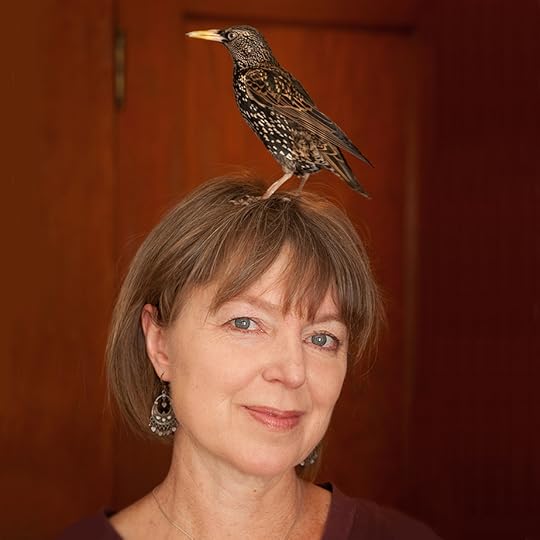 Lyanda Lynn Haupt with Carmen
Lyanda Lynn Haupt with CarmenAnd in that moment I thought of the story of Mozart and his starling. It was a kind of a funny moment; this is an Alice in Wonderland kind of rabbit hole idea. The connection between a sublime Western composer and a hated species of bird could lead to so many places.
I didn't think it would lead to Noam Chomsky and the field of linguistics (one of the paths I discovered ) but I did hope it would take me to Vienna and Salzburg. I thought of intertwined bird and human voices and our thoughts on animal consciousness---this came to me in a kind of a rush.
Then I thought to myself, but doesn't everyone already know about Mozart and his starling? It's kind of old news. Luckily, my husband happened to be home and having a work retreat at the house. Downstairs there was Tom and a team of six of his team members from the NGO where he works. They are smart people. I thought, I'll just go down and see if they know about Mozart's starling. It will be my sample group.
So I was in one of those whirlwind of inspirations that you don't always get. I dashed down the stairs and I ran into the room. And there was just silence. Everyone looked at me and my husband looked at me really awkwardly as if to say, honey, what are you doing? What I'd forgotten was that in my glamorous stay-at-home writer life, I was still wearing pajamas. I had not combed my hair. I was like Rochester's crazy wife in the attic. I don't think they even knew I existed.
So I asked my question. And nothing. Finally one really nice woman said, my dad's really into music history, I will ask him. So I went back upstairs with my answer and made it a point to get dressed, brush my hair and then come downstairs again so that the group could see that Tom's wife was not crazy. That's how it started. I was still working on my other book but I immediately started making notes.
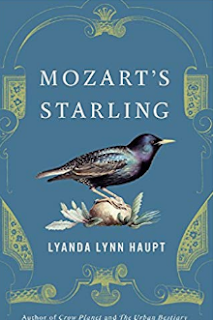
SR: I love the breadth of your interests---from Chomsky's Universal Theory of Language to Pythagoras to Mozart to starling poop, there are so many separate threads in this book that you weave together and make seem seamless. How do you do it? Is that a problem you gave yourself to solve?
LLH: Thank you and thank you for noticing. People who aren't writers might not look for that or notice it. It was actually really, really hard. Super hard. It took a lot of intention.
SR: I'm glad to hear you say that!
LLH: I looked back at my early notes and I'd written that I wanted to weave this story so it's tightly woven like a nest. Like a weaver finch. I love the weaver finches because they have crazy things dangling out from their nests but the nests are woven.
I don't think I can tell you how I did it. It took lots of trial and error. Not just back and forth on my own process but also with my editor and my copy editor. I'm thinking of the chapter where I'm at the hotel in Vienna and I'm trying to layer on Mozart's historical time, his relationship to the starling, my current curiosity and my trip. Also, Im thinking about all the things that might have occurred or things that have not occurred. And I'm dealing with it in all these different time periods and frames.
When I wrote the chapter I used different tenses. The Mozart part I wrote in the past and my current curiosity in the present. I let myself go with it even though that's a little unorthodox. Later, when the book was finished, my copy editor said, "I get it but I really think you need to choose. Tell me which one you want (past or present) and I'll fix it." That was very nice. So I tried it in my mind both ways and I consulted her and my editor. And finally I said, "I don't want to do it. Let's keep it fluid."
I don't mind pressing into a little bit of unorthodoxy once in awhile.
SR: I love how you include so many of your hopes for the book that didn't come to pass. The Noam Chomsky postcard episode and Carmen's mimicry (or not) of Mozart's music. I was so enamored with the details that you tell us never actually take place. Why did you include these?
LLH: I was writing about a subject that involved creativity. One of the threads that most reviewers didn't pick-up on is, what is the source of inspiration? And that's a messy path. I didn't want to mislead readers. And at the end, I exhort people to follow their own gifts as a form of art and creativity in the world. It would have felt disingenuous to make it seem like it had been a simple path. It was complicated, as I've said. Lots of dead ends. Lots of things that didn't go as I expected. I think sharing those moments made it more human and it made it more true.
SR: It also made it more meta. It's as if you're addressing the reader. This is what you think might happen, this is how things could have ended...You let us in on the creative process.
LLH: Right. And some of it is just funny. Carmen just wouldn't learn and Mozart's grave is not what you think it is. The moral coil is fraught.
SR: Well, the next question is specifically about humor. One of the many great surprises of the book is how incredibly funny it is. I've never laughed so much while reading a book. Never. There's the expected humorous situation of trying to write with a bird on the keyboard, the sounds of the coffee grinder, and also the intricacies of starling poop. Were you intentionally trying to be funny?
LLH: I tried to write with good humor. In part because of the kinds of subjects that I write about. I'm often writing about the modern ecological reality which is dire. Despair evoking. I read some good nature writers whom I admire, and yet I often want to pull out my hair from boredom! So much earnestness and holier-than-thou ness. I feel we will be more successful in our efforts if we bring some good humor. I love that people laugh when they read the book.
(At this point Carmen comes onto the table to closely inspect my notebook and pen.)
So this is what it was like writing the book. See how she's looking. She'll inspect your pen, she will poke at your pages. Oh, now she's gaping in your hair. It's so ingrained in her to search this way.
LLH: Ethology is coming back into vogue as we more and more accept animal consciousness. But there's this gap from the 1940's onwards beginning with B.F. Skinner where animal consciousness was not a topic for scientific discourse because it wasn't quantifiable. It's finally come back to something we can talk about. I say 'come back" because you know Darwin discussed animal consciousness.
SR Universal Harmony, sound that links the plants together was a new idea to me. You write that this is not unique to Western culture. Do you think that listening to Carmen's sounds daily has changed your way of listening? On a larger scale, how does living with a wild thing affect you?
We live in a listening world. It effects the way I walk out the door. I realize that every animal I will encounter is listening in its own unique way. I know I'm entering a listening world. I'd never dreamt of all that was going on with starling communication. What's going on with everyone else? It makes me more aware of what I say and how I say it. We're learning now that trees respond to our voices. For example, when I'm walking outdoors I try to, more than I did before, I try to mind my attention with a sense of calm, a sense of kindness. I know that sounds weird. I'm more aware of my intention because I know my intention is being received. It matters.
I think it was Gary Snyder who was asked how to interact with animals and his response was, "always be polite."
SR What has stayed with you the most from this book? What are you most proud of?
More people have written to me after reading this book than my other books. They say they will never look at starlings the same way again. But what I think what I'm most proud of is that bringing together all the different threads of this story together. I wrote a draft of this book and showed it to my editor and realized it sucked. I worked really hard to get it to the finished product.
Also. as a writer, and as a family, I'm proud that we were able to get beyond our preconceived notions of what it would mean to live with a wild animal. I had a set of expectations or anecdotes that I thought she would provide me with. But the other thing that happened were the surprises: her capacity for communication, her intelligence and the new things I had never known about starlings before and could have missed if we hadn't paid radical attention to what she had to say.
Finally, I was grateful for what you said about the poetic language of my work. One of my goals as a writer is to bring a different kind of language to a subject that doesn't usually receive literary or a beautiful kind of language. A language it doesn't often get. But deserves.
Published on August 23, 2018 22:24
May 31, 2018
The Art of the Interview - Seattle Review of Books

In a parallel world, I am, in turn, a singer, a private detective, an interviewer of interesting people. Of these three professions, I think interviewer might suit me best. A few years ago I was the curator for the Jack Straw Writers Program and my favorite part of the job was interviewing the twelve writers. I learned that a good question can cajole a writer into areas of her (or his) psyche that they may have not ever explored. A strong interview has all the positive qualities of a really interesting conversation with the added benefit of a spotlight on your thoughts and theories.
What's not to love about being interviewed?
Well, if you are an introvert (like me) there are many things to obsess about before the interview; for example, sounding stupid would live at the top of my list.
Turns out, I needn't have worried. Paul Constant of the Seattle Review of Books was charming, intelligent, and best of all, inquisitive. He made me feel interesting and on occasion, smart.
It was an over-the-top honor to be chosen as Poet-in-Residence for the Seattle Review of Books and to be interviewed by Paul Constant (who I recently saw interview Fran Leibowitz at SAL) was the highpoint of the month.
Here's the beginning of the interview with a reveal as to central theme of my next book...
Susan Rich’s poems are beautiful music
by Paul Constant
Susan Rich’s poems thrum with a rhythm all their own. Read any of our May Poet in Residence’s poems and you’ll likely be absorbed in the rhythm of the thing — dense internal rhythms, tricky beats in single lines, sentences that shouldn’t exist but somehow manage to thrive.
I don’t know, for instance, how Rich makes a line like “we accordioned together vaudeville-style” work. But in “Self Portrait with Abortion and Bee Sting,” it not only scans but it feels essential — like the only words that could logically fit there. Her poems are full of those impossible lines — if I ever wrote something as beautiful about an earthworm as “Pink hermaphrodite of the jiggling zither,” I would probably retire in triumph.
to continue reading, click here
Published on May 31, 2018 07:00

